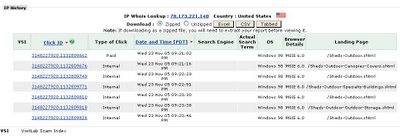This 17-page report from Google's click quality team makes a lot of sense. Look at the US search engine conference speaker list for the past three years and witness the same names saying much the same things. Most of them represented click fraud detection services. I don't blame them for promoting their services and I don't claim to know how good they all were. There had been this figure of 30% click fraud bandied around as an industry norm. I have not seen this in the few accounts I have access to but I am not in a position to guess what it might be.
The Google report on third-party click fraud auditing is critical of poorly substantiated estimates of click fraud. Quote:
Over the last year, these estimates have received widespread media coverage. A different kind of report (from Outsell, Inc.) has also been widely cited for estimating the scope of the problem. But in fact that report did not measure click fraud – it was an opinion survey of advertisers asking them to guess at the extent of the problem. Thus the report’'s conclusions about the percentage of fraud and financial loss for the industry are essentially a poll of the perception of the size of the problem (with the backdrop of the previous coverage of high estimates) rather than actual size of the problem. This is analogous to estimating crime rates in a country by asking some residents how much crime they think there is, and averaging those guesses to state that number is the actual rate.
The main problem seems to be fictitious clicks of two kinds:
- Fictitious clicks due to detection of page reloads as ad clicks.
- Fictitious clicks due to conflation across advertisers and ad networks.
The page-reloading behaviour problem is handled very nicely by
Visitlab. Their reporting shows a visitor's path through the site and shows the initial paid click and subsequent traversals of the same page as internal clicks. A poorly designed click fraud detection mechanism might show each reload as a separate click.

In the early days of Visitlab, such clicks showed as multiple (suspicious) clicks but no more.
I have not seen the second kind of problem, where each click goes through a third party audit service and clicks within the site are counted, as are clicks arising on another advertiser service such as Overture/Yahoo.



